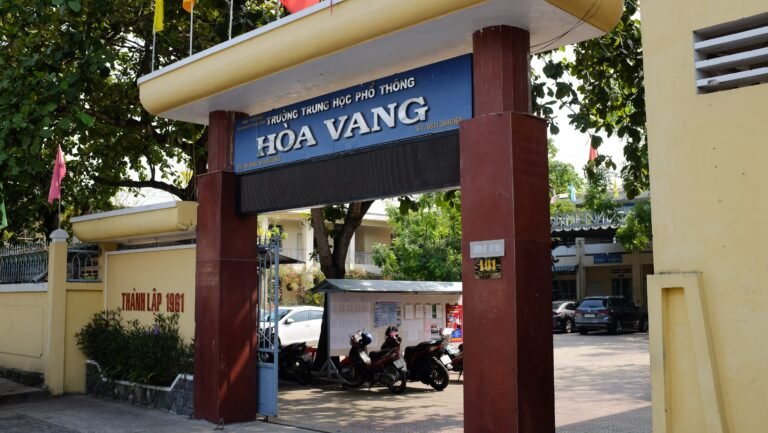Are you dreaming of turning your passion for the English language into an exciting adventure in Vietnam? TEFL.org has unlocked opportunities to teach and explore this vibrant Southeast Asian country.
Our guide will lay out everything from job requirements to cultural experiences, ensuring you’re well-equipped for this life-changing journey. Let’s dive in and transform your dream into reality!
Understanding the Teaching Landscape in Vietnam

Dive into the dynamic world of Vietnam’s educational arena where both traditional classrooms and innovative learning platforms are thriving. Explore how this sector’s expansion is paving new avenues for educators eager to immerse themselves in a culturally rich teaching environment.
Growth of the Education Sector
More students in Vietnam want to learn English. This makes the need for English teachers very big. Schools are opening up all the time to meet this need. Both public schools and private language centers are looking for teachers.
Vietnam’s education is getting better fast, especially in big cities like Hanoi. Here, lots of expats live and work, so there are more chances for English teaching jobs. Language schools keep growing as more people see how important English is for their future.
Types of Schools in Vietnam
Vietnam is home to a diverse range of schools that offer English classes. Each type of school serves a different purpose and has its own teaching environment.
- Training Centers: These centers are popular for after-school English learning. Kids and adults attend classes here in the evenings and on weekends. The jobs at training centers are often easier to get, and teachers usually follow a special curriculum designed for language instruction.
- Preschools and Kindergartens: Very young learners, from 18 months to 6 years old, go to these schools. Teachers enjoy a warm atmosphere, help from teaching assistants, and fun materials that make learning exciting for little ones.
- International Schools: These schools pay teachers well because they need high qualifications. Teachers must have a teaching license and often need an advanced degree. Students learn from international curricula in English at these prestigious institutions.
- Public Schools: Offering good salaries and benefits, public schools in Vietnam have reasonable workloads for teachers. Some may ask for a graduate degree or teaching license from their English educators.
- Universities: There’s a wide range of university teaching jobs in Vietnam. Less famous universities might hire foreign teachers for general English courses while top public universities want teachers with advanced degrees and experience.
Curriculums used in Vietnam
Schools in Vietnam offer different kinds of curriculums for teaching English. Some follow the International Baccalaureate (IB), which is known worldwide. Others use the U.S./AP curriculum that includes American courses and advanced placement classes.
Local Vietnamese schools often teach using methods from their country. There is also the National Curriculum for England, which British international schools use.
Each curriculum has its unique style and focus in how it teaches students English. Teachers might work with a lot of hands-on projects or get kids to talk a lot in class. Depending on where you teach, your lessons could be more creative or follow strict rules about what students need to learn.
Requirements for Teaching English in Vietnam

Navigating the prerequisites for English educators in Vietnam is essential, as it sets the stage for a successful teaching journey. With a clear understanding of qualifications and certifications needed, aspirants can confidently prepare to enter Vietnam’s vibrant academic sphere.
Qualifications Needed
To teach English in Vietnam, you need a TEFL certificate. This shows schools that you know how to teach languages. You must also speak English very well or show that you can use the language well.
Schools want teachers who can help students learn easily.
Before you start, make sure you have no criminal record and are healthy. These checks keep everyone safe at school. With these qualifications, you’re ready to learn about the importance of getting your TEFL certification next.
Importance of TEFL Certification
Having the right qualifications opens doors to teaching in Vietnam, and a TEFL certification is a key that unlocks many of them. This certificate shows schools you know how to teach English to people who do not speak it as their first language.
It’s more than just proof of your skills; it’s often a must-have for getting a good job. Schools want teachers with TEFL because it means they’re serious about making their classes great.
Getting certified can help you earn more money, too. Teachers with TEFL are seen as professionals and can be paid better salaries, ranging between $1,100 and $2,200 USD per month. Plus, this certification makes you stand out when applying for jobs in popular places like Ho Chi Minh City or Hanoi.
With so many wanting to teach in Vietnam, having TEFL could give you the edge over others who don’t have it.
Teaching English without a Degree
Even if you don’t have a college diploma, you can still teach English in Vietnam. You might find work at training centers that have their own way of teaching English. These places often need teachers and it’s easier to get a job here.
They also give you the lessons so you know what to teach.
If you like working with kids, preschools and kindergartens are good choices too. They are welcoming places where grown-ups help you and the teaching stuff is fun for everyone. Some universities even hire teachers who don’t have big degrees if they want to work with older students.
Remember, your pay may be less without a degree, but there’s still a chance to make money and enjoy living in Vietnam!
Teaching English with No Experience
You might not have a degree, but fear not! Having no experience does not stop you from teaching English in Vietnam. You can learn on the job and grow your skills as you work. Some schools offer training to help new teachers.
They show you how to plan lessons and handle a classroom. Teachers who are eager to learn often do well.
If you speak English well and want to teach, many places in Vietnam will give you a chance. Schools need teachers, so they hire people with energy and a love for sharing knowledge.
You may start by helping other teachers or by leading small groups. Over time, as you gain confidence, you could lead bigger classes all on your own!
The Benefits of Teaching English in Vietnam

Discover the unique advantages of embarking on an English teaching journey in Vietnam, where competitive salaries harmonize with a low cost of living, paving the way for an enriching cultural immersion and professional growth amidst its vibrant cities and breathtaking landscapes.
Embrace the opportunity to join dynamic teaching programs, opening doors to both personal and career development while experiencing the warm hospitality that characterizes this rapidly evolving nation.
Salary & Cost of Living
Understanding the salary and cost of living is crucial for anyone considering teaching English in Vietnam. Here’s a summary of what to expect:
| Category | Details |
|---|---|
| Average Salary | $1,100 to $2,200 USD per month |
| Public School Salary | $1,200 to $2,000 USD per month |
| First-time Teachers | About $1,200 USD per month |
| Experienced Teachers | $1,500 to $2,500 USD or more per month |
| Housing Costs | $200 to $600 USD per month |
| Food Expenses | $100 to $200 USD per month |
| Transportation | $50 to $150 USD per month |
Teachers relish the ability to live comfortably while saving a part of their income due to Vietnam’s low cost of living. Accommodation options are affordable. Food expenses won’t break the bank. Transportation is also reasonably priced, ensuring a pleasant lifestyle for English teachers in this vibrant country.
Teaching Programs in Vietnam
Vietnam offers a variety of teaching programs for English teachers. These programs cater to different needs and offer unique chances to experience Vietnamese culture.
- Public Schools: You might teach in government-run schools. Here, you will work with local students. The classes are often big and the focus is on grammar and writing.
- Private Language Centers: They have classes at different times, often in evenings and weekends. Kids and adults go to these centers to learn English.
- International Schools: These schools follow international curriculums. Teachers usually need more experience or a degree in education to get hired here.
- Business English Programs: Some companies hire teachers to help their staff speak better English. This type of job is good if you like working with adults.
- TEFL Programs: Organizations like TEFL.org provide courses where you can learn to teach English. After your course, they help you find a job in Vietnam.
- Volunteer Teaching: There are also chances to teach without getting paid. This way, you can help others while learning about life in Vietnam.
Discovering Vietnam’s Unique Culture
Teaching English in Vietnam is more than a job; it’s a chance to soak in the country’s rich traditions and vibrant way of life. Teachers get to see places like bustling Hanoi with its crowded streets and hidden temples.
They also visit Ho Chi Minh City, where history meets modern life in a mix of museums, markets, and food stalls serving up famous Vietnamese dishes.
Exploring the different parts of Vietnam brings teachers face to face with jaw-dropping sights like Halong Bay’s towering limestone islands. Every city has its own feel, from the ancient charm of Hoi An to Da Nang’s coastal beauty.
The experiences teachers gain reach far beyond the classroom walls, touching their hearts with every friendly smile and colorful festival they encounter.
The Process of Getting a Job to Teach English in Vietnam

Embarking on the journey to secure a teaching position in Vietnam involves navigating the visa application intricacies and scouring various platforms for available opportunities. It’s a path that requires preparation, patience, and an understanding of Vietnam’s governmental regulations surrounding employment.
Visa Process for Teaching Jobs
Getting a work visa to teach English in Vietnam involves several steps. Teachers must understand and follow these carefully to be allowed to work legally.
- Check if you have a bachelor’s degree and TEFL certification, as they are needed for the visa.
- Make sure you are at least 21 years old; this is required by Vietnamese law for teaching jobs.
- Gather documents: You need a passport with six months’ validity, photos, and a criminal background check.
- Get a health check from an approved clinic to show you are fit for work.
- Find an employer who will sponsor your work permit. Often, schools help with this process.
- The employer will submit your documents to the Vietnamese authorities to get the work permit.
- Apply for the work visa with your new work permit and other paperwork provided by your school or employer.
- Pay the visa application fee. This cost can vary depending on where you apply from.
- Wait for approval. Visa processing times differ but plan for it to take several weeks.
- Once approved, get your visa stamped in your passport either at an embassy or upon arrival in Vietnam.
Where to Find English Teaching Jobs in Vietnam
After sorting out your visa for teaching, you’re ready to look for an English teaching job in Vietnam. Here’s how to get started:
- Check online job boards: Websites like TEFL.com and Dave’s ESL Cafe list a lot of teaching jobs. You can find many options for different cities and schools.
- Use social media: Facebook groups like “English Teaching Jobs in Vietnam” are great places to connect with other teachers and find job postings.
- Contact language centers directly: Send your resume to places like ILA Vietnam or Apollo English. They often hire new teachers.
- Visit schools: If you’re already in Vietnam, stop by schools and talk with them about job openings.
- Register with TEFL.org: They help place teachers in jobs not just in Vietnam, but also in Cambodia and Japan.
- Attend job fairs: These events happen often in large cities and can be a good way to meet employers face-to-face.
- Ask around: Talk to people you meet. Many times, jobs are found through word-of-mouth.
- Hanoi – As the capital of Vietnam, there are many language centers and private schools looking for teachers.
- Ho Chi Minh City (Saigon) – The largest city has countless English language training opportunities.
- Smaller cities: Places like Da Nang and Hue also have a need for English teachers but might offer a more relaxed pace of life.
The Experience of Teaching English in Vietnam
Dive into the heart of the educational setting and unravel what daily life holds for an ESL teacher in Vietnam. Embrace a new realm where teaching methods meet cultural nuances, amidst bustling cities and serene landscapes, creating memories that shape both educator and student.
Classroom Culture in Vietnam
In Vietnam, the classroom culture is very organized. Teachers and students keep a professional way of talking to each other. Students are quiet and wait for their turn to talk. They raise their hands and wait for the teacher to say they can speak.
This shows respect in the classroom.
In many schools, there are lots of kids in one class, sometimes 40-50! But here’s something helpful: often there’s a Vietnamese co-teacher who works with you to handle so many students.
You can also make learning fun by playing games or dancing with younger kids like primary school students who love active lessons. Splitting the class into teams for competitions is a great way to get them using English and having a good time! Remembering these things about how classrooms work will help you as you teach in Vietnam.
Schedules and Start Dates
Teachers should be ready for different start dates as schools in Vietnam don’t all begin at the same time. K-12 schools and universities might have their own schedules. Some may start classes early in the year, while others might kick off later.
You could teach English to kids or adults at any time of the year. The great thing is many teaching jobs also offer extra perks like a place to stay, money for flights, and health care.
Next, let’s explore what it’s like living as a digital nomad in Vietnam.
Living as a Digital Nomad in Vietnam
After sorting out your schedule, you can fully embrace the lifestyle of a digital nomad in Vietnam. With the growing trend of teaching English online, many educators choose to live and work in different parts of this vibrant country.
The cost of living in Vietnam is low, allowing digital nomads to enjoy a comfortable life on their teacher’s salary. They often find that they can afford great accommodation, eat out frequently, and explore the diverse landscapes from bustling cities like Ho Chi Minh City and Hanoi to serene beaches in Phu Quoc.
Vietnam welcomes remote workers with its friendly locals and strong community of expats. Many digital nomads flock to co-working spaces or cafes with reliable Wi-Fi to keep up with their online tutoring jobs.
This dynamic enables them not only to earn money but also experience the rich culture, tasty food, and scenic beauty that Vietnam has to offer. Plus, being centrally located in Southeast Asia makes it easy for those who teach English online to travel around neighboring countries such as Thailand and Laos during their free time.
Top Cities in Vietnam to Teach English

Explore the vibrant urban landscapes and expanding educational opportunities in Vietnam’s top cities, where your teaching journey can thrive amidst a backdrop of rich history and modern growth.
Hanoi
Hanoi is a hot spot for TEFL teachers looking to work in Vietnam. With its growing number of language centers, the city offers many opportunities for English educators. The large expat community makes it easier for newcomers to adjust and find support among fellow teachers.
Living in Tay Ho is popular among expats because it provides a quieter and more relaxed lifestyle. It’s great for those wanting space away from the hustle of the city center. Plus, with Noi Bai International Airport close by, travel in and out of Hanoi is simple.
Teachers living here enjoy quick trips to beautiful places like Halong Bay or Trang An on their days off. However, be ready for Hanoi’s air pollution; it gets pretty high in winter months.
Ho Chi Minh City (Saigon)
Ho Chi Minh City, also known as Saigon, is a top spot for ESL teachers. It’s full of life with busy streets and markets. Teachers here enjoy the blend of traditional Vietnamese culture and modern comforts.
There are lots of schools looking for English teachers. This city offers a mix of state-run and private institutions.
Living in Ho Chi Minh City means you’re never far from beautiful sights like mountains and rice paddies. The city is perfect for those who love to explore after work or on weekends.
Many people come here to start their teaching careers because it’s vibrant but welcoming too.
Next up: Da Nang, another great choice for teachers looking to make Vietnam their new home.
Da Nang
Moving from the bustling streets of Ho Chi Minh City, Da Nang offers a coastal experience for English teachers. This city stands out with its mix of modern life and natural beauty.
It’s known as a great place to live and work because it has nice beaches and friendly locals.
Teachers in Da Nang enjoy good job opportunities in schools and language centers. TEFL.org is one group that helps people get started teaching here. They offer courses to help you learn how to teach English.
Living in Da Nang can be fun for teachers who like to explore and meet new friends while they work.
Conclusion
Teaching English in Vietnam opens up a world of adventure and opportunity. With the right qualifications, like a TEFL certificate, you can explore bustling cities and beautiful landscapes while helping others learn a new language.
Remember to follow legal requirements for work permits and visas. Get ready to dive into an enriching cultural experience as an English teacher in Vietnam!


